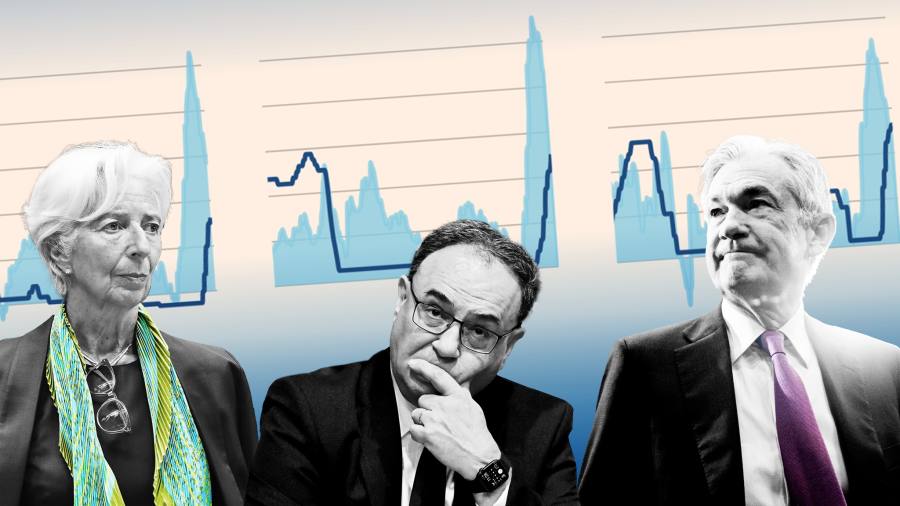Receive free Global inflation updates
We’ll send you a myFT Daily Digest email rounding up the latest Global inflation news every morning.
Central banks have been raising interest rates at the fastest pace since the 1990s, but the most severe bout of inflation in a generation is yet to be tamed.
While many were late to spot just how big a problem this wave of inflation would prove, officials representing the world’s 20 largest economies have now increased rates by an average of 3.5 percentage points each since they began tightening borrowing costs.
However, neither Federal Reserve chair Jay Powell nor European Central Bank president Christine Lagarde expect inflation to return to their common 2 per cent target before the start of 2025. While headline consumer indices have fallen, central bankers cite higher core inflation, tight labour markets and pressures in the services sector as evidence that prices will continue to soar for some time yet.
So what explains inflation’s persistence in the face of aggressive rate rises?
More delayed than usual
Monetary policy always comes with a lag, taking about 18 months for the impact of a single rate increase to fully seep through into spending patterns and prices.
Monetary policymakers began raising rates less than a year and a half ago in the US and UK, and less than a year ago in the eurozone. They went higher than the neutral rate — where they are actively restricting the economy — only a few months ago.
But some central bankers and economists believe lags may be even longer — and the effect of the tightening less potent — this time around.
“Maybe monetary policy is not as powerful as it was several decades ago,” said Nathan Sheets, chief economist at US bank Citi.
They argue that, despite surging borrowing costs, growth has proven surprisingly resilient, especially in the services sector that makes up the bulk of economic output in most economies. “The major economies and the global economy as a whole have absorbed rate hikes extraordinarily and surprisingly well,” Sheets said.
A long-term shift away from manufacturing towards services, which require less capital, could also mean slower transmission of a tighter monetary policy.
Structural changes in important parts of the economy — including housing and labour markets — between now and the 1990s may explain why rate rises had a much snappier and sharper impact then.
Housing trends play a role
Shifts in the housing market may be key in explaining why interest rate rises are taking longer to bite.
In several countries, the proportion of households that either own their property outright or are renting has risen. Fixed-rate mortgages are now more popular than flexible ones, where higher central bank rates feed through to households’ spending power almost instantly.
In the UK, the share of UK households owning a property with a mortgage has declined from 40 per cent in the 1990s to less than 30 per cent. Those with a floating rate mortgage has gone from 70 per cent in 2011 to slightly more than 10 per cent this year.
Andrew Bailey, governor of the Bank of England, said last week that those trends meant “the transmission of monetary policy is going to be slower as a result”.
Labour markets are tight
The after-effects of the pandemic on hiring trends are still being felt.
Widespread labour shortages remain — especially in the services sector, boosting wage growth and in turn inflation.
Lagarde said last week that services sector companies may be engaging in “labour hoarding”, fearful of being unable to recruit should growth strengthen. The sector could be “insulated from the effects of policy tightening for longer than in the past,” the ECB president said.
Central bankers’ conundrum
Central bankers’ initial insistence that inflation would prove shortlived led to delays in discarding decades of aggressive and ultra-loose monetary policy.
Those delays may have made inflation all the more difficult to vanquish with higher rates, as price pressures broadened from a problem affecting a small number of products hit by supply chain bottlenecks to a far broader phenomenon, hitting almost all goods and services.
The Bank for International Settlements, often dubbed the central bankers’ bank, warned last year that, if interest rates are raised too little or their effect is much delayed, countries might slip into an environment where high inflation becomes the norm.
The risk is that shifting back to 2 per cent inflation may require central bankers to increase borrowing costs to a point where they endanger the health of the financial system.
The collapse of several midsized US lenders and the troubles of Credit Suisse earlier this year have been blamed on higher borrowing costs.
If growth disappears too, economists expect more pressure on central bankers tasked with trying to tame inflation.
Jennifer McKeown, chief global economist at Capital Economics, now expects higher rates to “push most advanced economies into recession in the months ahead”.
Read the full article here




